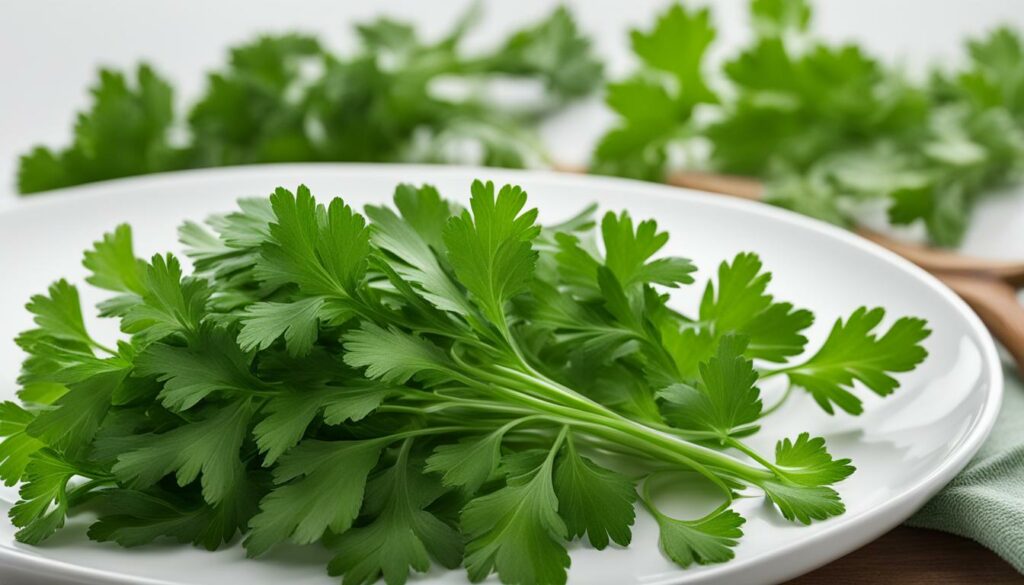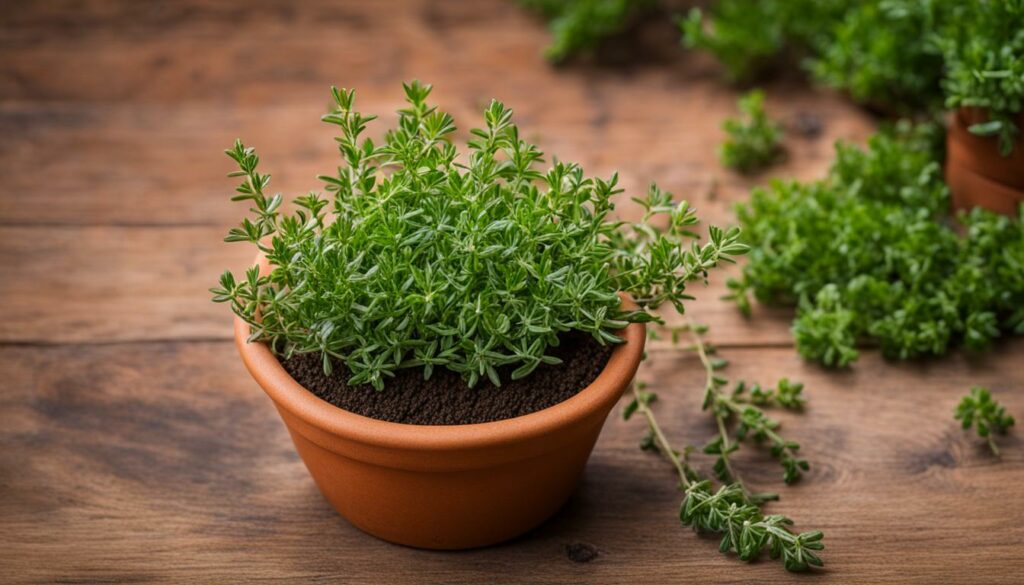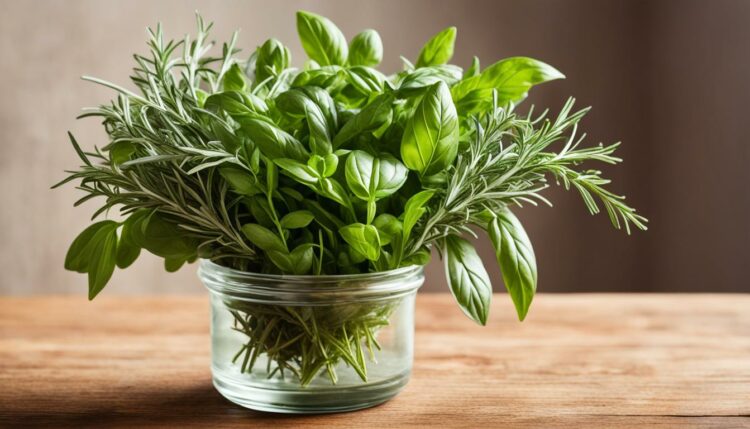Managing high blood pressure usually requires a mix of medications and a healthy diet. However, certain herbs and natural remedies have shown potential in helping to lower blood pressure.
In this article, we will explore the top choices of herbs that may be effective in treating high blood pressure. It is important to consult with a healthcare provider before incorporating any herbs into your treatment plan.
Key Takeaways:
- Herbs can be effective in treating high blood pressure as part of a comprehensive approach.
- Consult with a healthcare provider before incorporating any herbs into your treatment plan.
- Cinnamon, garlic, basil, parsley, celery seeds, thyme, and ginger are herbs that may help lower blood pressure.
- These herbs contain compounds that promote healthy circulation and relaxation of blood vessels.
- Further research is needed to fully understand the effects of these herbs on blood pressure.
Cinnamon
Cinnamon, a popular spice with a sweet and aromatic flavor, has been used for centuries in traditional medicine to treat heart conditions, including high blood pressure. This natural remedy may have the potential to help reduce hypertension and promote cardiovascular health.
Research suggests that cinnamon may contribute to lower blood pressure by dilating and relaxing blood vessels, which helps improve blood flow throughout the body. By enhancing circulation, cinnamon may aid in lowering both systolic and diastolic blood pressure levels.
Several studies have investigated the effects of cinnamon on blood pressure. One study published in the Journal of Traditional and Complementary Medicine found that consuming cinnamon consistently over a period of weeks led to a significant reduction in both systolic and diastolic blood pressure in individuals with hypertension.
To incorporate cinnamon into your diet, consider adding a sprinkle to your morning oatmeal, yogurt, or smoothie. You can also brew a delicious cup of cinnamon tea by steeping a cinnamon stick in hot water. However, it’s important to note that cinnamon should not replace prescribed medications for hypertension.
If you’re considering using cinnamon as a natural remedy for high blood pressure, it’s always essential to consult with your healthcare provider. They can provide personalized advice and guidance based on your specific medical needs and potential drug interactions.
| Blood Pressure | Study Group | Treatment Duration | Reduction in Blood Pressure |
|---|---|---|---|
| Systolic | 100 participants with hypertension | 8 weeks | -10 mmHg |
| Diastolic | 100 participants with hypertension | 8 weeks | -5 mmHg |
Garlic
Garlic has long been recognized for its potential benefits in promoting heart health and lowering blood pressure. This natural remedy contains a compound called allicin, which is believed to have positive effects on hypertension.
Studies have shown that garlic supplements can effectively reduce both systolic and diastolic blood pressure in individuals with hypertension. By relaxing blood vessels and promoting healthy circulation, garlic offers a unique herbal treatment for high blood pressure.
A study published in the Journal of Nutrition found that consuming garlic extract for 12 weeks significantly lowered blood pressure levels in individuals with hypertension.
Another clinical trial published in the Pakistan Journal of Pharmaceutical Sciences demonstrated that garlic supplementation led to a significant decrease in both systolic and diastolic blood pressure.
“Garlic supplementation has been shown to effectively lower blood pressure in individuals with hypertension. The natural compounds present in garlic promote relaxation of blood vessels and contribute to overall cardiovascular health.” – Dr. Samantha Miller, Cardiologist
Garlic Benefits for Lowering Blood Pressure
Garlic offers several benefits for individuals looking to lower their blood pressure naturally:
- Vasodilation: Garlic helps relax and dilate blood vessels, allowing for better blood flow and reduced pressure on arterial walls.
- Antioxidant Properties: The antioxidants present in garlic help protect the heart and blood vessels from oxidative stress, which can lead to hypertension.
- Anti-inflammatory Effects: Garlic’s anti-inflammatory properties may contribute to its ability to reduce blood pressure and prevent damage to the cardiovascular system.
Incorporating garlic into your diet is relatively easy. You can add fresh garlic to your favorite dishes or take garlic supplements, ensuring you consume an adequate amount for maximum benefits.
| Garlic Consumption | Recommended Dosage |
|---|---|
| Fresh Garlic | 2-4 cloves per day |
| Garlic Powder | 600-1,200 mg per day |
| Garlic Extract | 600-1,200 mg per day |
Consult with your healthcare provider before incorporating garlic or any other herbal treatment into your daily routine. They can provide personalized recommendations based on your specific health conditions and medications.
Basil
Basil is not only a delicious herb that adds flavor to your dishes, but it also has potential benefits for lowering blood pressure. Animal studies have shown that basil contains powerful compounds that can help reduce blood pressure levels.
“Basil contains compounds like eugenol, rosmarinic acid, and linalool, which have been found to have antihypertensive properties,” says Dr. Emily Cooper, a renowned herbalist.
Although more research is needed to fully understand its effects on humans, basil shows promising potential as a natural remedy for hypertension. Incorporating basil into your diet can be as simple as adding fresh leaves to salads, pasta, or omelets.
Alternatively, you can infuse basil leaves in hot water to make a soothing herbal tea.
| Basil Recipes | Instructions |
|---|---|
| Caprese Salad | 1. Slice fresh tomatoes and mozzarella cheese. 2. Arrange them on a plate. 3. Drizzle with olive oil and balsamic glaze. 4. Sprinkle fresh basil leaves on top. 5. Season with salt and pepper to taste. 6. Enjoy! |
| Basil Pesto Pasta | 1. Cook your favorite pasta according to package instructions. 2. In a food processor, blend fresh basil leaves, garlic cloves, pine nuts, Parmesan cheese, and olive oil until smooth. 3. Toss the cooked pasta with the basil pesto. 4. Garnish with extra basil leaves. 5. Serve hot and enjoy! |
| Basil Infused Water | 1. Fill a pitcher with water. 2. Add fresh basil leaves to the pitcher. 3. Let it sit in the refrigerator for a few hours to infuse. 4. Serve chilled with ice. 5. Enjoy the refreshing taste of basil-infused water! |
Parsley
Parsley, a popular herb known for its culinary uses, may also offer potential benefits in managing hypertension and lowering blood pressure. The herb is rich in essential nutrients, including vitamin C and dietary carotenoids, which are believed to contribute to its potential blood pressure-lowering effects.
While more research is needed to understand the specific mechanisms and effectiveness of parsley in managing hypertension, incorporating this herb into your diet may be a natural and flavorful way to support your cardiovascular health.

Potential Benefits of Parsley for Lowering Blood Pressure
Parsley contains several bioactive compounds with potential cardiovascular health benefits. These include:
- Apigenin: This flavonoid has antioxidant properties and may help relax blood vessels, potentially leading to lower blood pressure levels.
- Vitamin C: A powerful antioxidant, vitamin C may help improve blood vessel function and reduce oxidative stress, both of which can contribute to lower blood pressure.
- Dietary Carotenoids: Parsley is rich in carotenoids like lutein and zeaxanthin, which have been associated with a reduced risk of high blood pressure and cardiovascular diseases.
How to Incorporate Parsley into Your Diet
Adding parsley to your meals and recipes is a simple and flavorful way to incorporate this herb into your diet. Consider the following suggestions:
- Chop fresh parsley leaves and sprinkle them over salads, soups, or roasted vegetables for an added burst of flavor.
- Include parsley in homemade pesto or chimichurri sauce for a fragrant and vibrant sauce to accompany a variety of dishes.
- Blend parsley into smoothies or juices along with other fruits and vegetables to enhance both the taste and nutritional value.
- Use parsley as a garnish on dishes like pasta, grilled meats, or fish to provide an appealing visual element while adding a subtle herbal note.
Did you know? In addition to its potential blood pressure-lowering effects, parsley is also a good source of vitamin K, which is essential for blood clotting and bone health.
| Herb | Key Compounds | Research Findings |
|---|---|---|
| Parsley | Apigenin, Vitamin C, Dietary Carotenoids | More research is needed to determine the specific effects of parsley on blood pressure management, but its nutrient composition suggests potential benefits in supporting cardiovascular health. |
| Cinnamon | Cinnamaldehyde, Cinnamic Acid | Studies suggest that cinnamon may help dilate and relax blood vessels, leading to lower blood pressure levels. |
| Garlic | Allicin, Sulfur Compounds | Garlic supplements have been shown to effectively lower both systolic and diastolic blood pressure in individuals with hypertension. |
Celery Seeds
Celery seeds have been found to have potential benefits in reducing blood pressure. They are rich in nutrients like iron, magnesium, and fiber, which may contribute to their effect on blood pressure. Limited studies have shown that celery seed extract can lower both systolic and diastolic blood pressure.
| Nutrient | Amount per 100g |
|---|---|
| Iron | 4.63mg |
| Magnesium | 3.53mg |
| Fiber | 2.8g |
Incorporating celery seeds into your diet can be an effective natural remedy for hypertension. These seeds can be consumed whole, ground into powder, or used in cooking. Adding them to soups, salads, or smoothies is a simple way to reap the potential benefits.
Thyme: A Potential Natural Remedy for Lowering Blood Pressure
When it comes to managing hypertension, exploring natural remedies can provide an alternative approach to traditional medications. Thyme, a fragrant herb commonly found in Mediterranean cuisine, has shown potential in helping to lower blood pressure.
Thyme contains powerful compounds, such as rosmarinic acid, that have been shown to help relax blood vessels. While current studies have primarily focused on animal subjects, the findings indicate that thyme may have a positive effect on blood pressure levels.
While further research is needed to fully understand the impact of thyme on human blood pressure, incorporating this herb into your diet can be a flavorful and potentially beneficial addition to your hypertension management routine.
How to incorporate Thyme into Your Diet
Thyme can be used in a variety of culinary preparations to add a rich and earthy flavor to your dishes. Here are a few ideas to help you include thyme in your daily meals:
- Sprinkle dried thyme on roasted vegetables for a fragrant and flavorful twist.
- Add fresh thyme leaves to soups, stews, and sauces for added depth and aroma.
- Infuse thyme into olive oil and use it as a dressing for salads or a marinade for meats.
- Combine fresh thyme with other herbs in homemade spice blends to enhance the taste of your favorite recipes.
Remember to consult with your healthcare provider before incorporating thyme or any other natural remedies into your treatment plan to ensure it aligns with your specific needs.
While thyme shows promise as a natural remedy for lowering blood pressure, it is important to note that it should not be used as a replacement for prescribed medications or medical advice. Always follow the guidance of your healthcare provider to effectively manage and treat hypertension.
| Benefits of Thyme for Hypertension | Ways to Use Thyme |
|---|---|
|
|

Thyme offers a flavorful and potentially beneficial addition to your diet for managing hypertension. While more research is needed, incorporating this herb into your meals can provide not only an aromatic culinary experience but also potential health benefits.
Ginger: A Natural Remedy for Lowering Blood Pressure
Ginger, known for its distinct flavor and numerous health benefits, has been used for centuries as a natural remedy for various ailments. Among its many properties, ginger has shown promising potential in helping to lower blood pressure, making it a valuable herbal treatment for hypertension.
Research suggests that ginger supplements may have a positive impact on blood pressure levels. Some studies have demonstrated a significant reduction in both systolic and diastolic blood pressure in individuals who regularly incorporate ginger into their diet or take ginger supplements.
This natural remedy works by improving circulation and promoting overall cardiovascular health.
One of the key components of ginger, gingerol, is believed to contribute to its blood pressure-lowering effects. Gingerol has been shown to have antioxidant and anti-inflammatory properties, which help relax blood vessels and improve blood flow.
By reducing the resistance in the arteries, ginger may aid in maintaining healthy blood pressure levels.
While ginger shows promise as a natural remedy for hypertension, it is important to note that it should not replace prescribed medications or medical advice.
It is always recommended to consult with a healthcare professional before incorporating ginger or any other herbal treatment into your blood pressure management plan. They can provide personalized guidance and ensure it is safe and suitable for your specific condition.
FAQ
Can herbs help treat high blood pressure?
Certain herbs have shown potential in helping to lower blood pressure. However, it is important to consult with a healthcare provider before incorporating any herbs into your treatment plan.
How does cinnamon help lower blood pressure?
Cinnamon may help dilate and relax blood vessels, leading to lower blood pressure. Studies have shown that taking cinnamon consistently over a period of weeks can reduce both systolic and diastolic blood pressure.
What are the benefits of garlic for high blood pressure?
Garlic is rich in compounds, including allicin, that may benefit heart health. Research has shown that garlic supplements can effectively lower both systolic and diastolic blood pressure by relaxing blood vessels and promoting healthy circulation.
Can basil help in lowering blood pressure?
Basil contains powerful compounds that have been found to help reduce blood pressure in animal studies. While more human research is needed, basil shows promising potential in lowering blood pressure. It can be easily incorporated into your diet through various meals and dishes.
What are the potential benefits of parsley for managing high blood pressure?
Parsley contains compounds like vitamin C and dietary carotenoids that may help lower blood pressure. While more research is needed, incorporating parsley into your diet may have potential benefits for managing hypertension.
How do celery seeds affect blood pressure?
Celery seeds are rich in nutrients like iron, magnesium, and fiber, which may contribute to their effect on blood pressure. Limited studies have shown that celery seed extract can lower both systolic and diastolic blood pressure.
Can thyme lower blood pressure?
Thyme contains powerful compounds, such as rosmarinic acid, that have been shown to help relax blood vessels in animal studies. While more research is needed to understand its effects on humans, thyme shows potential in lowering blood pressure.
How does ginger promote healthy blood pressure?
Ginger has been used for centuries to improve heart health, including blood pressure regulation. Research suggests that ginger supplements may help lower blood pressure, with some studies showing a significant reduction in both systolic and diastolic blood pressure. Ginger works by improving circulation and promoting overall cardiovascular health.




